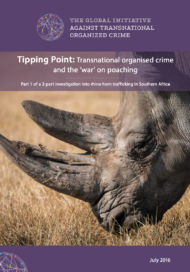Posted on 29 Dec 2018
Written by Joyce Kimani, a journalist sponsored under the ENACT programme partnership with Thomson Reuters.
China’s ban on the ivory trade has given new hope to environmentalists campaigning against the poaching of Africa’s elephants.
And while some officials say they have seen some impact already on the demand from China, others are concerned that it is still business as usual for criminal syndicates moving ivory and other illegal wildlife products such as rhino horn or pangolin scales from Africa to Asia – and that traders still find ready buyers.
An estimated 100 African elephants are killed each day by poachers seeking ivory, meat and body parts, leaving only 400,000 remaining, according to World Elephant Day Organization.
As the world ushered in the New Year 2018, environmentalists across the globe celebrated the closure of the largest legal ivory market: China.
Some officials and campaigners cited positive results from the ban on trade in ivory when arguing against China’s recent announcement that it was considering loosening a prohibition on trade in rhino horn and tiger bones. China later said it had postponed a decision, but wildlife activists said loosening that ban could allow organised criminals to hide behind legal trade – as had been the case with ivory.
Countries in eastern Africa have struggled to deal with wildlife crime syndicates, which not only have the financial clout to pay poachers, but also to corrupt customs and transport officials, to ensure their illicit goods reach markets in Asia.
In an exclusive interview, South Sudan National Wildlife Service Spokesperson Brigadier General Khamis Adieng Ding decried the problem of criminal cartels in the region, citing bribes being paid to customs officers and staff at different airlines.
He said the international smuggling networks used sophisticated means of communication – and plenty of cash – to get illegal wildlife products across the borders and overseas.
“These guys are very smart and they have got a lot of money. And you know money can talk,” Ding said.
He said, however, that the Environment Department was determined to keep up the fight, with a strong patrolling system and a crime-fighting unit deployed at all checkpoints in South Sudan, including at Juba International Airport.
Kenya, a significant transit country in Africa for wildlife illegal imports, welcomed the announcement of the ban by Chinese President Xi Jinping in September 2015, and its subsequent implementation this year.
Xi’s announcement immediately forced the price of ivory to drop significantly in Hong Kong. According to undercover investigators from the Wildlife Justice Commission (WJC), in February 2017 raw ivory was priced at an estimated $660/kg, down from US$1,322/kg in 2015, before China announced its ban.
Kenya had become a favored route for contraband wildlife, with ivory from Tanzania, Mozambique, Democratic Republic of Congo (DRC), Uganda, Zambia and South Sudan smuggled to Asia through Nairobi’s Jomo Kenyatta International Airport and Kilindini Port in Mombasa.
But Kenyan environmentalist and conservationist Emily Mwangi believes barring the commercial processing and sale of ivory products in China will help significantly in protecting Africa’s largest land beast. This, she says, is because limiting the markets for finished ivory products would force traders to opt for other businesses and leave the elephants alone.
According to the Wildlife Protection and Trafficking Assessment in Kenya 2016 report by wildlife trade monitoring group TRAFFIC, passengers with wildlife-related contraband have traveled on national carrier Kenya Airways, which operates direct flights from Nairobi to eastern and southeast Asia.
And airline staff in the region say that despite the Chinese ban, they still see smuggling by small-scale traders as well as by organized crime syndicates – facilitated by corrupt payments to airport security officials.
“We still get people arrested over ivory, especially bracelets. However, many of them buy their way out. Corruption, especially with the security forces, ensures that one can buy your way out even with as little as $50,” said one airline source, who declined to be identified because of safety concerns.
“(So) the airport security is lenient… The only way to capture the illegal goods will be at the arrival terminals of … countries which are stricter in their checks,” the source added.
In addition to the international flights, land borders also present little difficulty in preventing syndicates from trafficking wildlife specimens.
Illegal products flow into Kenya from Uganda, South Sudan and the Democratic Republic of Congo, via busy crossings including the Busia and Malaba posts on the border with Uganda. And poachers have also been arrested in the past near the frontiers with Tanzania, Ethiopia and Somalia, according to the TRAFFIC report.
A customs official based at Busia, on Kenya’s border with Uganda, said in an interview that poachers use the cheap local motorbike taxis, known as bodabodas, to ferry contraband to the Kenyan side.
“Officials manning the border are often lazy, or hungry for cash,” he said. “(For) less than a dollar they allow one to cross with any goods and do not carry thorough inspections on the luggage. They assume that since these are operators based in the busy entry points, they cannot ferry illegal goods,” said the customs officer, who insisted on anonymity because of concern for his safety.
The official said he did not take cash himself, since not only would it damage his reputation for integrity, but might also put him in jeopardy. He had received threats from other senior officials before, putting his life and his kin in danger.
“I see cash exchange hands here every day, but I cannot raise my voice as I will be killed. I have received several threats before, when I asked them why they engaged in the crude trade,” the source said.
He said a particular trick used by traffickers to get illegal wildlife products across the border was to target wheelchair users, since border guards often gave them only cursory inspection – often on receipt of a bribe of around $10. He estimated that wheelchair traffickers could get more than $30 per transaction.
“In most cases, they hide the ivory in the form of beads, earrings, necklaces, bangles, buttons, soap dishes, chopsticks, drafts and chess pieces, walking sticks and even pendants,” he said. But the source said he believed there had been some reduction in ivory smuggling since implementation of the Chinese ban, adding: “The limit in demand has however affected the poachers, who, I feel, are now looking for new markets.”
At the Uganda-South Sudan border post at Nimule, a customs official, who also asked not to be identified over fears for his safety, cited a need for training border patrol staff in how to identify illegal wildlife trophies. This could be done through joint training of wildlife officials and immigration departments in all East African countries, he said.
Border officials were often unable to identify ivory definitively, especially if it had been disguised, he said, adding that equipment such as scanners or chemical tests could help in making positive identification.
“Poachers have realized this loophole and often take advantage,” the official said. “There is a need to come up with sensors at the borders which will detect illegal ivory, just like we have the ones that can detect guns, bombs or drugs at the airport.”
Phillip Yator, a reformed poacher from Loboi village in Baringo, believes China’s ban will help eradicate ivory sale. Yator, who in his wildlife trading heyday was known by locals as “Poacher”, used to hunt a variety of game and negotiate prices with brokers, who he said operated from major hotels in the area. He spent much of his time poaching in Lake Bogoria National Reserve, one of Kenya’s protected areas, famous for flamingoes, hot springs and a variety of wildlife species.
The father of eight says he poached for income to feed his family, with the help of 12 dogs. “I started poaching in 1992 and stopped in 2001, when it became dangerous,” he said. “The government became more serious with curbing poaching. A lot of my friends were arrested and some of the poachers we used to know were even killed. It had become very dangerous. The government should go back to this re-commitment to fight the vice, which saw many people shun the trade,” he added.
He now heads the Bogoria cultural Dance Group and campaigns to reform other poachers. He believes with the backup of the law, many will refrain from the trade since they fear the repercussions.
“You will eventually get caught. If lucky you will end up in jail. Most of my former poachers ended up dead,” he added.
Emily Wanjala* a relative of one of three poachers killed in Kenya’s Mount Elgon National Park in January this year, said the phone still rings with calls and text messages from traders seeking to do business.
“I’ve had people approach us and ask if there was anyone who continued with the trade after his demise.
Every day it gets more scary. Calls come from as far as Lokichogio, Nyakimencha, Isbania and Namanga,” Wanjala said.
She hopes the ban on ivory will reduce sales, but is concerned that it could actually drive trade further underground and open more black markets. This is because the demand of ivory is still high and brokers are still negotiating prices, despite the Chinese ban.
“Even with the strict laws before, the trade was still high. The demand will always be there. The high rates of corruption in the countries will always ensure that the ivory reaches its end-users,” she added.
Environmentalist and animal rights campaigner Sammy Mwangi, from Nairobi believes the market for ivory will always be there, despite tough laws.
His late father was a poacher who served seven years in prison, after being caught with raw ivory. Mwangi says many legal loopholes need to be closed, but also points to problems such as corruption within Kenya’s nature reserves, saying wardens are heavily involved in ivory trade.
He said his father was arrested after a deal went sour in a dispute with a warden.
“My father, now late, was sold out by one of the wardens after they disagreed on the prices,” Mwangi said in an interview. “I still remember when they came for him in the house (in) the wee hours of the morning. They ordered him out and took him to where exactly the tusks were. It was not from their investigation, (he) was being sold out.”
“Even if the wardens are well paid, humans are selfish and it’s in their nature to want more. Greed is what is finishing our elephants. Unless we teach the world the importance of wildlife, no law would be able to stop anyone who wants to poach,” he added.
A senior official at Kenya Wildlife Service (KWS ) Official based in Lake Nakuru National Park said poaching had significantly reduced this year, partially as a result of increased monitoring of the area.
“There are more stringent measures. The fines are heavier and the surveillance is very high in the last few months. It is also easier to detect and track poachers, which has deterred many,” said the source, who declined to be identified because of safety concerns and worries about their job.
But even though anti-poaching efforts have increased, those who succeed in getting ivory or rhino horn can still find ready markets online. Buyers can purchase ivory using the “dark web” or even forums on social media – and pay with plastic money or cryptocurrencies.
A 2016 wildlife crime report by the United Nations Office on Drugs and Crime (UNODC)found that illegal wildlife trade is a major contributor to transnational flows of illicit cash.
The report also found that most of the ivory supply appeared to come from countries at peace, such as Tanzania and Kenya. Such countries were not only targets for poachers, but were also used by syndicates for the transit of illicit wildlife products from other countries too.
“The people conducting this poaching … range from opportunists to dedicated elephant hunters,” the report said. “Media have also reported incidents where rangers, charged with protecting wildlife populations, were found to be active in poaching.”
Studies such as the 2016 TRAFFIC report have also detailed how militia groups such as the Janjaweed operating in Sudan, Chad and Niger and the Lord’s Resistance Army (LRA), may also have also benefited from illegal ivory transiting through Kenya.
In Tanzania’s Selous Game Reserve, the elephant population has fallen from 110,000 to 15,200 in 40 years, a dire situation that saw UNESCO add it on the World Heritage in Danger list in 2014.
And transnational organised crime is only one of the threats to the elephant population. In an exclusive interview, Kenya Wildlife Services Acting Director General Julius Kimani, said persistent droughts in the country pose an even greater threat to the elephants than poaching.
“Most of the animals, especially those which are territorial, are facing challenges on what to eat and where to eat. Last year we lost quite a number of elephants through droughts in the Tsavo. Due to this persistent drought, we have to look into ways of possibly deliberately feeding these animals during the dry seasons,” he said.
According to Kimani, Kenya needed to improve protection of elephants through greater coordination between ministries.
He said that in 2016, poachers in Kenya killed 96 elephants and 14 rhinos. He applauded China’s decision to ban the sale of ivory, but was cautious about how this may change the illicit trade.
“We are very happy and excited that China has banned ivory because that was the largest market. We are still checking to see after banning whether the traders in China will not move to transfer their business to another market. We are just monitoring it,” he said.
“We are looking forward to sign additional agreements with the Chinese government on this new development,” he said, adding that Kenya was also planning further cooperation with the Chinese government on providing advanced equipment, including drones and GSM support for patrols in the wildlife reserves.
“Last year we got 30 vehicles and about 100 tents from the Chinese government,” Kimani said. But he added that better coordination was still needed, as some of the vehicles were ill-suited to the terrain where they would most useful.
South Sudan’s Ding said that while the region has struggled to deal with wildlife crime syndicates, there had been some successes, including the arrests of people in possession of ivory and other wildlife products, such as bush meat.
“(We) arrested a Ugandan who was apprehended with ivory from Entebbe through Juba to Malaysia,” Ding said. “Currently there is a Chinese citizen serving a two-year jail term as he was found with a walking stick, popularly known as a Walk-Rhino horn. He was arrested in Rumbek and was also forced to pay a fine.”
Ding said more than 37 elephants were killed in South Sudan earlier this year, and expressed concern over the state of rhinos, a current attraction, in the country.
“We used to be the home for the wild rhino which we have not seen recently,” he said, adding that officials were trying to conduct a survey in various parks to confirm if the rhinos had been wiped out.
Ding said he believed peace would help the people of South Sudan to understand the value of wildlife to draw tourists to the country’s the six national parks and twelve game reserves and he challenged poachers to stop contributing to the illicit trade – and to see the benefits.
“You will finish the animals. You will decrease the population of the animals. These are the attraction,” Ding said. “It’s the main reason why they (tourists) are coming to South Sudan.”
This story was produced by [Talkafrica] It was written as part of Reporting Transnational Organised Crime, a media skills development programme run by the Thomson Reuters Foundation in partnership with the EU funded ENACT programme.More information at http://enactafrica.org/. The content is the sole responsibility of the author and the publisher.”



